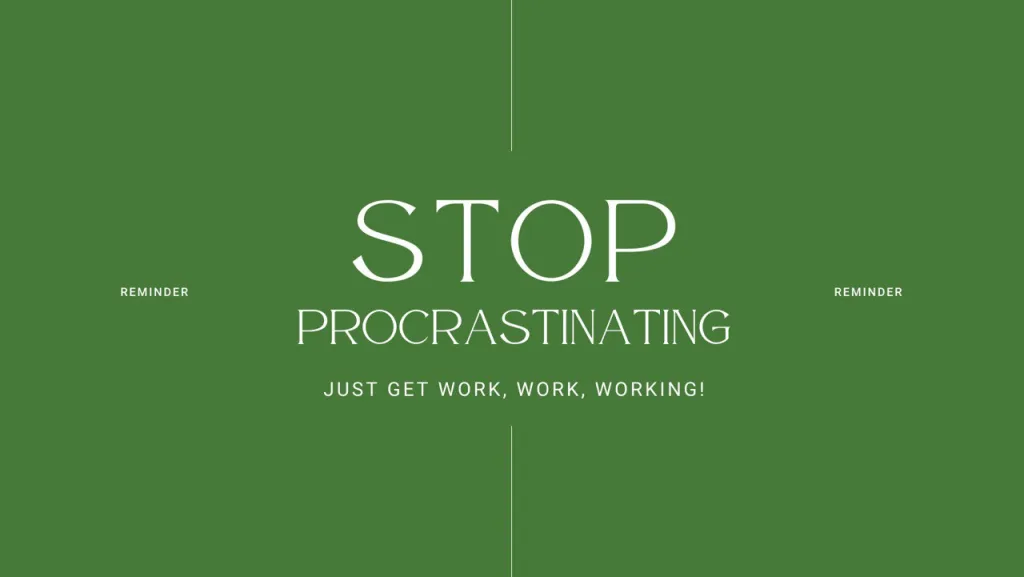
Procrastination is something everyone faces at some point. It’s that moment when you avoid tasks, even though you know you should be getting things done. It may seem like a simple delay, but it’s more complicated than laziness. Understanding why we procrastinate is the first step to overcoming it. Here’s a deeper look at why we procrastinate and how to turn it into productivity.
Fear of Failure
Fear of failure is one of the most common reasons for procrastination. We often delay starting when we are scared that our work won’t be good enough or fear criticism. This fear creates anxiety, and rather than face it, we avoid the task altogether.
How to Fix It: Instead of aiming for perfection, focus on progress. Break your tasks down into smaller, manageable steps. Tell yourself it’s okay if things aren’t perfect; getting started is the most important part. Small steps will build momentum.
Perfectionism
Perfectionism can also cause procrastination. When you demand that everything be flawless, it can feel too overwhelming to even begin. The desire to make every detail perfect may prevent you from starting at all, or cause you to tweak the same part of the task endlessly.
How to Fix It: Recognize that perfection is unrealistic. Focus on getting the task done rather than trying to make it flawless. Aim for “good enough” and let go of the constant need to perfect everything.
Feeling Overwhelmed
Tasks that seem too large or unclear often lead to procrastination. When a task feels too big to handle, we can become paralyzed by its sheer size or complexity, making it hard to know where to start.
How to Fix It: Break down big tasks into smaller, more manageable pieces. Create a step-by-step plan and focus on completing one part at a time. This makes the task less intimidating and easier to approach.
Lack of Motivation
Sometimes procrastination simply stems from a lack of interest or motivation. If the task feels boring or doesn’t align with your passions, it’s easy to put it off in favour of something more exciting or enjoyable.
How to Fix It: Find a way to connect the task to something that motivates you. Whether it’s a bigger goal, a reward for completing it, or even how the task fits into your personal growth, creating a sense of purpose can ignite motivation.
Distractions
In today’s world, distractions are everywhere. Social media, texting, and other easy-to-reach distractions can take our attention away from tasks. Procrastination thrives in a distracted environment because it provides immediate gratification compared to the task at hand.
How to Fix It: Limit distractions by creating a designated workspace. Turn off notifications, silence your phone, or use apps that block distracting websites during work. Use time management techniques like the Pomodoro method to stay on track.
Low Self-Esteem and Self-Doubt
Sometimes, procrastination results from negative self-talk or self-doubt. When we don’t feel confident about our abilities, it’s easy to avoid tasks to avoid the possibility of failure or disappointment.
How to Fix It: Build your self-esteem by recognizing your past successes and reminding yourself that it’s okay to not be perfect. Practice self-compassion, and take one small step at a time. With each action, your confidence will grow.
Lack of Accountability
When no one is holding us accountable, procrastination can feel like a safe choice. Without deadlines or someone to check in on us, we may feel there’s no immediate pressure to act.
How to Fix It: Create accountability by sharing your goals with a friend or colleague. Set deadlines for yourself or work alongside someone who can encourage you to stay on track. You can also use productivity apps that help you track your progress and remind you of deadlines.
Emotional Avoidance
Procrastination is often an emotional response. If a task is associated with stress, frustration, or other negative emotions, we might avoid it in an attempt to avoid dealing with those feelings. This creates a cycle of avoidance and delay.
How to Fix It: Acknowledge the emotions behind your procrastination. Practicing mindfulness or journaling can help you confront these emotions instead of avoiding them. Once you recognize the root cause of your procrastination, you can more easily tackle the task at hand.
Lack of Routine
A lack of routine can also contribute to procrastination. Without structure, it’s easy to let tasks slide or feel lost in a sea of responsibilities. A lack of routine leads to confusion about what needs to be done and when.
How to Fix It: Establish a routine. By setting aside dedicated time for tasks, you eliminate decision fatigue and create consistency. Start with a small schedule and build upon it. The more you stick to a routine, the easier it becomes to stay productive.
Procrastination is something everyone experiences, but it doesn’t have to control you. understanding the underlying reasons for procrastination and using specific strategies to overcome them, you can turn procrastination into productivity.



